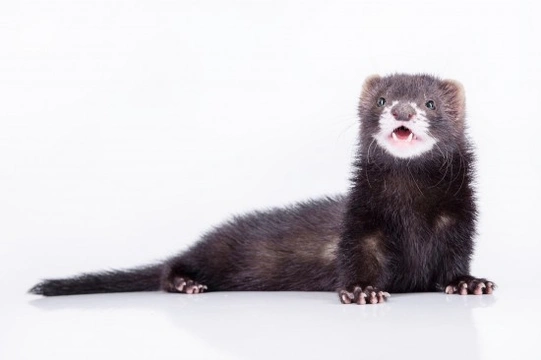
The six main causes of gastrointestinal disease in ferrets
Ferrets are generally robust and healthy little animals, and as long as they are kept within a healthy environment and have all of their needs met, will often go through their whole lives without ever becoming seriously sick or ill. However, gastrointestinal disease is ferrets (diseases or problems with some part of the digestive tract) are particularly common, and something that the ferret owner should be aware of and able to identify within their own pets.
While some forms of gastrointestinal disease in ferrets appear to manifest for no reason or come out of the blue, some are readily identifiable and in many cases, preventable, so it is important for the ferret owner to understand gastrointestinal disease, and how they can minimise the chances of it affecting their own pets.
Read on to learn more about six of the most common gastrointestinal problems in ferrets.
Foreign bodies
Ferrets are well known to be prolific chewers, and like nothing more than having a range of chew toys to hand! Ferrets that are not provided with sufficient safe and appropriate hard chews will invariably find something else to gnaw on, and most of these things will be unsuitable for one reason or another! Ferrets can easily inadvertently digest small parts of toys, or pieces of things they are chewing on, which may then lodge in the stomach or another part of the digestive system. Older ferrets can also be prone to hairballs from grooming, which again can build up in the stomach and be problematic.
If your ferret appears to be lethargic and suffering from stomach pain that is not accompanied by vomiting or diarrhoea, you should consider the possibility that they have a foreign body lodged in their stomach. Veterinary investigation, x-ray and sometimes surgery may be required to remove it.
Gastritis
Gastritis is an inflammation of the stomach caused by a bacterial infection that leads to ulcers and bowel disease. Gastritis commonly causes vomiting and diarrhoea in the ferret, but fortunately treatment is usually fairly straightforward once the condition is diagnosed. A combination of treatment with antibiotics to deal with the infection and bismuth to settle the stomach and stop diarrhoea are usually recommended.
Parasitic infection
Parasitic infections of the digestive system are not particularly common in the ferret, but they can occur. Particularly as ferrets are carnivorous and are often fed snacks of raw meat, ferrets have slightly elevated risk factors for contracting parasitic infections such a Coccidia or Giardia that can be present within meat, or from dirty living conditions and stale drinking water. Parasitic worms are again rare in the ferret, but not unheard of. Parasitic infections can also be passed easily from ferret to ferret.
General malaise and sickness accompanies parasitic infections of the stomach, often accompanied by diarrhoea and sometimes sickness. Veterinary treatment will be required to eliminate the parasites responsible for the infection.
Dental problems
Like many carnivorous animals, older ferrets can suffer from a range of common dental problems including gingivitis, tartar, tooth decay and plaque. Infection of the pulp of the teeth is often commonly seen in older ferrets. The propensity of ferrets to enjoy chewing and gnawing on hard objects can go some way towards stopping dental problems from developing, as this has a brushing effect on the teeth that can help to keep them healthy.
Scheduling dental check ups for your ferrets as they age is important, so that any problems can be addressed before they lead to infections or any further problems of the gastrointestinal tract.
Eosinophilic gastroenteritis
Eosinophilic gastroenteritis is a tricky condition in the ferret, which can lead to extreme digestive discomfort, vomiting, diarrhoea and dehydration. In people and in many other animals that can develop the condition, eosinophilic gastroenteritis is often considered to be linked to a food allergy or sensitivity, and undergoing a process of elimination can help to deal with the problem. However in the ferret, this has proven to be ineffective, and no conclusive proof of food sensitivities or allergies has been linked to the condition in ferrets.
Eosinophilic gastroenteritis is characterised by often heavy diarrhoea, which is usually accompanied by mucus and even blood. Prompt treatment is required, as ferrets affected with the condition can soon become very sick.
Diarrhoea and viral infections
Ferrets can be susceptible to a range of viral infections, all of which lead to acute diarrhoea and a fast loss of condition. Distemper is one of these conditions, which is acute in onset and often fatal, but fortunately, ferrets can be vaccinated against the condition. Other viral conditions such as Coronavirus or rotavirus can also lead to acute diarrhoea, as can conditions such as irritable bowel disease, which can have a range of causes.
If your ferret is suffering from diarrhoea, it is important to definitively identify the cause of this, or the virus responsible. Your vet will usually require a faecal sample for analysis to do this, and sometimes a blood sample or gut biopsy as well.



